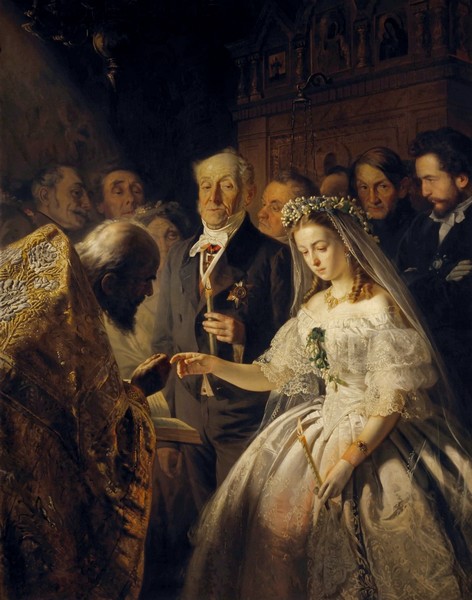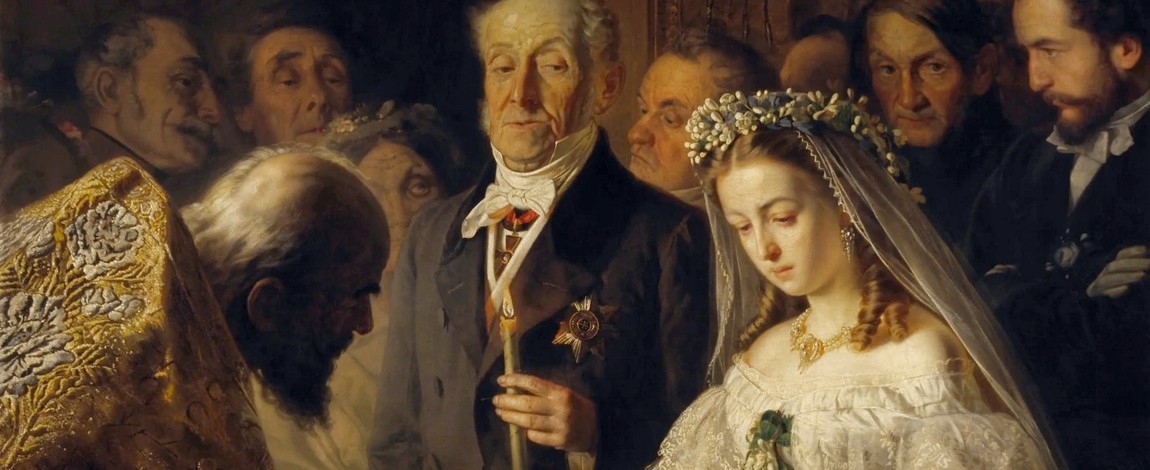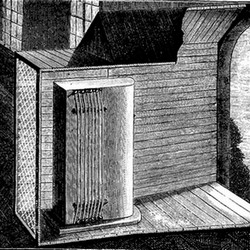
"Mr. Collins, to be sure, was neither sensible nor agreeable; his society was irksome, and his attachment to her must be imaginary. But still he would be her husband. Without thinking highly either of men or matrimony, marriage had always been her object; it was the only provision for well-educated young women of small fortune, and however uncertain of giving happiness, must be their pleasantest preservative from want. This preservative she had now obtained; and at the age of twenty-seven, without having ever been handsome, she felt all the good luck of it."
The first time I read Pride and Prejudice, as a teenager, these lines impressed me, and I copied them to a notebook. We find them in chapter 22, just after Charlotte Lucas has agreed to marry William Collins, a stupid and pompous man who still has a great virtue: he is the heir of Longbourn House, the state where the Bennets lived. Reading this chapter, I was sorry for the poor Charlotte, who was not only condemned to living with, but to the service of, someone so unbearable. I was surprised by her coldness in accepting it.
I realized with time that it was not coldness, but practical sense; she had to marry, and time was running out. Without Mr. Collins' proposal, her alternatives would have been limited once she had accepted her failure. In practice, she would be a servant of her sister-in-law, given that he would depend on her brother; young ladies without brothers would try to get a job as a governess or a lady of company (again, a servant). At least, getting married would be an accomplishment in her life, she'd have her own place and be more independent. Over time, I also realized that the freedom that women now have to marry or not, and to choose freely with whom (at least in our European context), is a recent luxury.
Since Lied, as a genre, is about life, there are also songs about unhappy brides. Surely, the most well-known song with a crying bride is Auf einer Burg, from Liederkreis, Op. 39 by Schumann. Miquel Carbonell, a student of the ESMUC master's degree in Lied, told us about this piece. I remember he was unsure if the bride would cry out of happiness or pain, and I found this remarkable because for me, she has always cried out of sorrow (or fear, or uncertainty). I don't know if you have an opinion about it, you want to share it.
The song we will hear this week, Bei einer Trauung [At a wedding] tells us about a marriage that is, without a doubt, a disaster. The poem is by Eduard Mörike, and was published in 1838, in his first collection of poems. He'd been a Lutheran pastor for twelve years, four of them in the same parish, after having gone through a few without really establishing himself. He didn't speak from experience, he wasn't married yet, but in those years, he must have blessed numerous weddings, and it's inevitable to think that some of those ceremonies inspired him with these verses.
The poem describes the wedding of principal people, as nobles attend. The verb that Mörike used to use to express marriage in the second verse caught my attention as it is not “trauen” but “copulieren”, a form that is now considered archaic and, according to the Duden dictionary, typical of legal vocabulary. That is, the poet presents everything to us with a lot of pomp.
The first humorous feature is found in a play on words that are difficult to translate. The German phrase “der Himmel hängt voller Geigen” translates, literaly, as " Heaven hangs full of violins”, and is equivalent to “seeing things through rose-colored glasses”. Mörike replaces the ¨word “Himmel” [heaven] with “Orgel” [organ], and then says that there's nothing in the heaven. It doesn't matter how hard the musician tries.
Then the poet tells us, in the second stanza, that we look at the bride, and she weeps bitterly; even the groom displays a sour expression. This is, definitely, a caricature; noble people use to keep their composture, even if they are marrying in grief; at most, some tears slip through the bride's cheek. Mörike tells us that the couple doesn't love each other, and he must have regretted finding himself there as a pastor. What will they do together?
Hugo Wolf included this poem in his Mörike-Lieder, Bei der Trauung is no 51 of the collection. He didn't speak either from experience, he didn't get married, but he was a great observer. The humour of the verses is present in the music and also in the indications in the score, “Langsam und mit Humor”. What we hear is almost like a funeral march; listening to the song without knowing the text, no one would say that we are attending a wedding.
The performers can bring out the absurdity and make us laugh at the parody, or they can bring out the sadness in the story, as in the version I've picked. It is a bittersweet interpretation that refers us more than others to Mörike’s goodness, he used to be understanding of human weaknesses, and to Wolf’s tenderness, he always knew how to be close to his characters (similar to Mozart, however unbearable the characters may be). I hope you will enjoy this version, which is by Olaf Bär and Geoffrey Parsons. If you feel like a more humorous (even sarcastic) interpretation, try Wolfgang Holzmair and Imogen Cooper.
Vor lauter hochadligen Zeugen
copuliert man ihrer Zwei;
die Orgel hängt voll Geigen,
der Himmel nicht, mein' Treu!
Seht doch, sie weint ja greulich,
er macht ein Gesicht abscheulich!
Denn leider freilich, freilich
keine Lieb' ist nicht dabei.
In front of honorable, noble witnesses
the two of them are being wed;
the organ music is full of pleasant anticipation,
but nothing else is, my dear!
Look how she cries so terribly,
and he makes such an awful face!
For, it is very sad to say, of course
there is no love here.
(translation by Emily Ezust)


















Comments powered by CComment